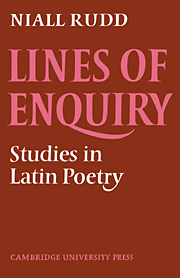Book contents
- Frontmatter
- Contents
- Preface
- Abbreviations
- 1 HISTORY: Ovid and the Augustan myth
- 2 IDEA: Dido's culpa
- 3 IMITATION: association of ideas in Persius
- 4 TONE: poets and patrons in Juvenal's seventh satire
- 5 ARCHITECTURE: theories about Virgil's Eclogues
- 6 THEORY: sincerity and mask
- 7 TRANSLATION
- Index of writers, scholars and translators
- Frontmatter
- Contents
- Preface
- Abbreviations
- 1 HISTORY: Ovid and the Augustan myth
- 2 IDEA: Dido's culpa
- 3 IMITATION: association of ideas in Persius
- 4 TONE: poets and patrons in Juvenal's seventh satire
- 5 ARCHITECTURE: theories about Virgil's Eclogues
- 6 THEORY: sincerity and mask
- 7 TRANSLATION
- Index of writers, scholars and translators
Summary
Unlike imitators, all translators aspire to faithfulness. But, as we know, this unity of purpose is largely nominal. One sets out to affect his readers in the same way as the original writer affected his; another strives to produce the sort of poem that the ancient author would have given us had he been born an Englishman; a third resists the spirit of his own age to avoid being ephemeral, while a fourth aims to turn out a contemporary work capable of standing on its own feet. And what kind of reader should the translator have in mind? The general reader who can compare the work only with other translations, or the man who has enough Latin or Greek to make some judgement of the version's accuracy, or the scholar who is assumed (sometimes wrongly) to be an expert? In discussing such matters some translators remind us that the letter killeth while the spirit giveth life; others with equal sincerity point out that if the letter is ignored the spirit will probably be sacrificed as well.
All these aims are to some degree nebulous, and a couple at least are absurd in principle. Yet they do serve as guides to the translator, helping him to decide what he wants to do. What he achieves is another matter. One doesn't have to read many versions to see that there is nearly always a gap, and sometimes a chasm, between intention and performance.
- Type
- Chapter
- Information
- Lines of EnquiryStudies in Latin Poetry, pp. 182 - 210Publisher: Cambridge University PressPrint publication year: 1976



